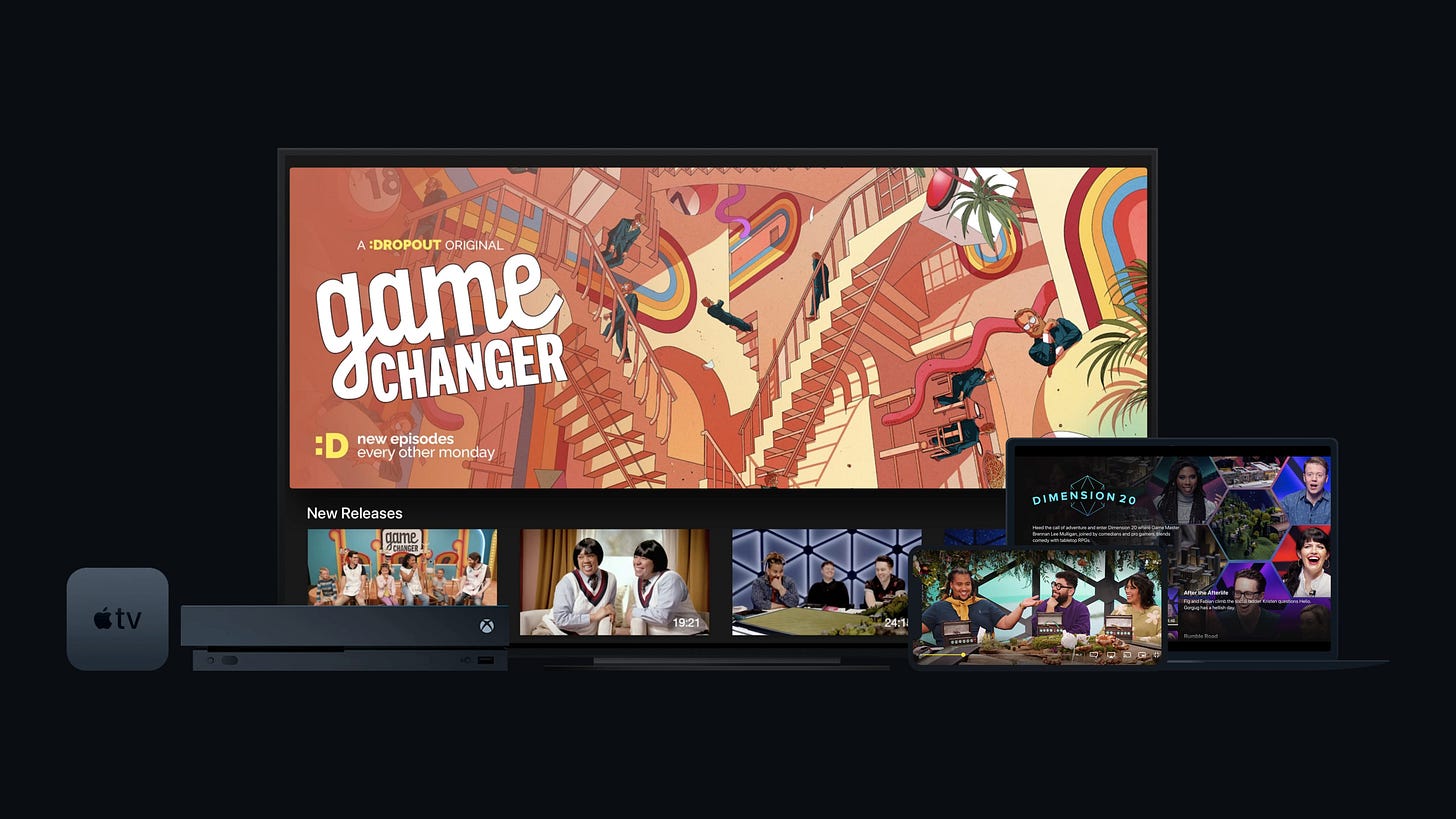Change for Creatives
Generational obsolescence? Marketing sans purpose? Musical lessons with fries? To be cringe is to be... free?
The rampant disruption in the wider media & creative industries I have been close to for two decades, is well documented. The challenge (and in many cases inability) of legacy media corporations to find a new normal, has been a storm that has not yet abated. Now, AI has added a new tornado in the mix.
Less thought is given to individual journeys. Or indeed, entire groups of professionals who are forced to find new paths in the fog.
Change in the way brands approach their persona can also be cyclical; the rapid disenchantment around purpose-driven brand initiatives is a timely case in point.
▶️ Curated/Cuts meets a spiritual music guru trading in French fries, visits deserted public housing spaces in London, and ponders a call for advertising creativity.
➕ Quickies on Vimeo's new streaming product, Fremantle’s new push into sports, Google’s fraying relationships with independent publishers, and Gen Z softening on Millenials.
This is the Colour Bar- where creativity, content, culture, tech, brands & humanity collide.
Creatives in a changing world.
Hindsight is a wonderful and terrible thing. I thought this as I mulled on some creative professionals’ journeys; we all know people whose career has, after many years of journeying, suddenly chosen to not quite gone the way they expected.
Disruption of industries and the expectations around people in it, is not new. The march of technology is the most frequent- but by no means only- driving force of change. Yet individuals do not- and cannot- adapt in the same way as the companies they work in. They are not always blessed by the wider strategic perspectives and organisational knowhow that their employers have access to.
“It’s the end of work as we knew it”.
In The Gen X Career Meltdown, the NYT traces a few stories of those who entered the creative industry in the 90s, or enjoyed its heyday through to the early 2000s. It is a mostly sobering account of those who grew up in an analog world and shaped their careers in it too, or as it morphed into a digital one.
So yes- hindsight is a wonderful and terrible thing; here, we see people grapple with market shifts that might seem obvious now, but difficult for the average person to identify and act upon, when in the midst of it. This is accentuated when the work you are doing is closely tied to your identity, your passions, your sense of who you are. And if, you simply love it.
“Every generation has its burdens. The particular plight of Gen X is to have grown up in one world only to hit middle age in a strange new land. It’s as if they were making candlesticks when electricity came in. The market value of their skills plummeted.”
These are tricky times to navigate. While the same Gen X parameters and timelines don’t apply as we travel east, I know of many similar cases where the career trajectory has (seemingly) stalled. ‘Reinvention’ is routinely demanded. It is an easy catchword, but a difficult task.
“Just when they should be at their peak, experienced workers in creative fields find that their skills are all but obsolete.”
And this is not exclusive to Gen X or any other theoretical demographic cohort.
That this happens is in itself not surprising. Technology, society, the market- they have a way of upending expected pathways. It is happening again now, as powerfully transformative technologies are changing the way we work, in ways most cannot even fully know or predict. Yet also, the implications on wider creative spheres speak to a different kind of change. The creative world comes with its own deeply personal ideas and expectations around expression, art, the desire to engage in creative work; and how what we do, shapes who we are (and who we think we are, and who we want to be).
It’s hard to leave a vocation that provided fulfilment and a sense of identity. And it isn’t easy to reinvent yourself in your 50s, especially in industries that put a premium on youth culture.
This also led me back to one of my long held beliefs, that people in the wider creative/ production industries are some of the best equipped to provide value outside their own lane. This industry, sometimes almost by default, teaches you to think on your feet, to find ways to make things happen- the corp speak equivalent of adaptability, problem-solving, agility. What it may not teach you is to become an entrepreneur, or run your own business; which is freely touted as the go-to solution for all creatives who lose their existing roles.
Organisations that have the ability to see these experiences for what they can being to different sectors, are more often than not likely to benefit from taking a ‘punt’ on such individuals.

The NYT piece by Steven Kurutz.
Marketing sans purpose?
As we enter a period where the term ‘woke’ has become a universal pejorative, shorn of any noble intent it once had, brands that hitched the purpose wagon are now quickly (and sometimes, conveniently) decoupling. In cases where it was opportunistic- whether blatant, or subtle- this is probably a good thing. At the same time, it would be harsh to paint all purpose-led initiatives as merely useful, only for profit.
“We must reckon with how we’ve trivialised activism by turning it into comms strategy, how we’ve co-opted movements only to abandon them when the winds changed.”
Maybe consumers bought into some of these purported intentions, and rejected others. Or maybe they never cared? I feel it is worth pointing out that this was through a time when every youth research piece and cultural insight told us otherwise. Young people, we were consistently told, held purpose at a very high value. They would embrace brands that displayed love for humans and the planet, and unequivocally reject those that did not. As a major media MD once said to me, while referencing his teenage daughter- “compassion is now cool?”.
There is definitely a case that this approach has mostly not furthered the causes it professed love for, and was probably never going to. And maybe most relevantly, it furthered the belief that consumption habits can save every cause that needs saving. (Though if you think of it, that is so appropriately capitalist, where consumption is at the heart of all that is good and prosperous).
“By making purchasing decisions moral declarations, we sold the idea that we could self-correct through consumption. And brands were our champions at the centre of it all: our profitable agents of social reform.”
While activism might well be best left to activists, brands abandoning cause en masse cannot be desirable either. They hold both a consumerist and narrative influence. They may not always make concrete long lasting impact directly, but they can certainly still help illuminate the path.
» Eugene Healey writes astutely on how marketing’s head-first dive into making brands purpose-driven didn’t really work.
Curated/Cuts.
1.
More Ball Games.
“With 7,000 signs across London’s housing estates warning against ball play, over half a million children are being discouraged from being active. “
London Sport’s 'More Ball Games' campaign looks to reclaim space for young people to play, trying to turn restrictions into opportunities.
via Subomi Odanye who has a deep dive here.
2.
McDonalds India goes the mockumentary route to promote its popular Shake Shake fries. A “musically blessed gentleman” aka Papaji, eminently godman-like in his ways, has discovered a unique rhythm only possible while shaking the Shake Shake bag. This is Shakashuka.
If such spiritual and musical growth is your thing, there are more tutorials here.
3.
“The Woman Who Walked Around Soho" looks to recreate the iconic ‘The Man Who Walked The World’ Johnnie Walker ad. A monologue from Karen Martin- the new President of UK’s Institute of Practitioners in Advertising or IPA- is her/their manifesto to revitalise UK advertising and creativity.
Calling for more talking, more creative, less science and templates, this is smart- though stops just short of being rousing .
Vimeo Streaming
Vimeo has announced ‘Vimeo Streaming’, expansively being described as enabling creators to roll out “their own Netflix”. This is maybe a tad misleading; its promising but less revolutionary than it might sound. Some key features they are offering to ‘professional creators’ include:
Launching custom-branded streaming services. White-label web, mobile and TV apps for all major platforms,
Custom branding, colours; video categorisation, playlists; artwork, custom layouts.
Vimeo handles backend infrastructure, content hosting, payments, app management.
Piracy protections.
AI tools for localisation.
For the creators this could mean more ownership, less dependence on algorithmic platforms, and direct audience revenue. Some established players have already been working with Vimeo on this- groups like The Try Guys and the Sidemen, to run subscription services separate from YouTube. Vimeo says that this is now a leap ahead.
Important to note is this is very much geared to established players with robust setups, creator teams with resources, reliable pipeline of content and existing libraries. Think indie media companies, educators and e-learning, sports and performing arts.
Creators wishing for platform independence, escaping the pressure of ad revenue and fickle algorithms will love the sound of this. But discoverability remains a challenge (probably one of the biggest in our incredibly noisy world). This is why algorithms are so important and so frustrating and so powerful.
Quickies
Fremantle has announced a new global sports unit to focus on non-scripted and documentaries and new digital formats; through “partnerships with rights holders, brands, first look and co-production deals.”
Google's introduction of AI-generated answers and changes to its search algorithm have caused a significant decline in traffic to independent websites, disrupting the relationship between Google and publishers. “the search product had fundamentally changed in the AI era.”
In the continued woe around the ‘traditional’ Hollywood model not working, Ryan F speaks to Chris McGurk, about his ‘winning formula’. “I hated how everybody on Wall Street and in the entertainment press set up this big thing of “streaming versus theatrical,” with streaming being the villain, because it was helping to destroy this great institution in America.”
Apparently, over in the US, Gen Z is falling in love with millenials.
“No longer does Gen Z feel burdened by the label ‘cringe’. To be cringe is to be free.”
* Cover photo by Keisuke Higashio on Unsplash



